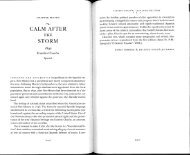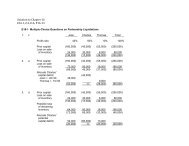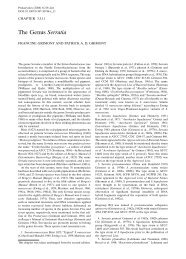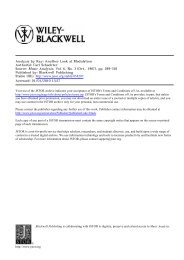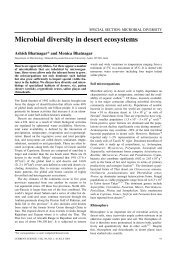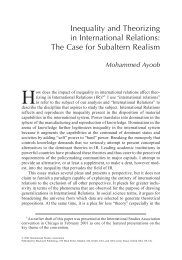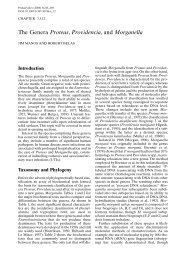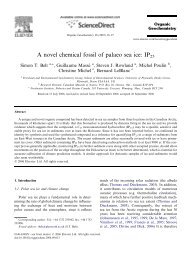A NEW SCRAMBLE FOR AFRICAN OIL? HISTORICAL, POLITICAL ...
A NEW SCRAMBLE FOR AFRICAN OIL? HISTORICAL, POLITICAL ...
A NEW SCRAMBLE FOR AFRICAN OIL? HISTORICAL, POLITICAL ...
Create successful ePaper yourself
Turn your PDF publications into a flip-book with our unique Google optimized e-Paper software.
African Affairs, 106/423, 229–251 doi:10.1093/afraf/adl042<br />
© The Author [2007]. Published by Oxford University Press on behalf of Royal African Society. All rights reserved<br />
Advance Access Publication 27 November 2006<br />
A <strong>NEW</strong> <strong>SCRAMBLE</strong> <strong>FOR</strong> <strong>AFRICAN</strong> <strong>OIL</strong>?<br />
<strong>HISTORICAL</strong>, <strong>POLITICAL</strong>, AND BUSINESS<br />
PERSPECTIVES<br />
JEDRZEJ GEORGE FRYNAS AND MANUEL PAULO<br />
ABSTRACT<br />
It has been suggested that Africa is experiencing a ‘New Scramble’<br />
thanks primarily to its oil and gas wealth, with the United States and the<br />
People’s Republic of China actively competing for access to Africa’s<br />
resources. This article aims to scrutinize the claim that Africa is facing a<br />
New Scramble, analysing the nature of the economic and political changes<br />
at work, the importance of Africa’s oil, and the political and economic<br />
forces behind the new oil rush. The article starts with an overview of the<br />
phenomenon labelled by some as the ‘New Scramble’. The main body of<br />
the article evaluates the existence of a New Scramble from three subject<br />
perspectives: history, international relations, and business studies. Finally,<br />
by analysing the likely impact on the economies of oil-producing states, it<br />
considers whether we should dismay or rejoice over the ‘New Scramble for<br />
Africa’. It concludes that the existence of a New Scramble or a US–Chinese<br />
race for Africa should be treated with some caution and that the use of<br />
terms such as ‘scramble’ and ‘race’ is perhaps misleading, while the economic<br />
impact of oil investments is likely to be bleak.<br />
AFRICA IS FREQUENTLY VIEWED AS A LOSER IN THE PROCESS of economic<br />
globalization. Writers have emphasized that Africa is of little relevance<br />
‘because no important economic interests are greatly affected’. 1 But<br />
Africa’s oil and gas is one of the few outstanding exceptions to the<br />
perceived insignificance of Africa. The United States will soon depend on<br />
Africa for a quarter of its total crude oil imports, and Africa already<br />
accounts for more than a quarter of China’s oil imports today (discussed<br />
below). According to the BP chief executive John Browne, ‘Unless geologists<br />
succeed in finding new and so far unidentified provinces, as consumers<br />
we will all be dependent on supplies from just three areas — West<br />
Africa, Russia and, most important of all, the five states around the Mideast<br />
Jedrzej George Frynas (g.frynas@mdx.ac.uk) is Professor of Corporate Social Responsibility<br />
and Strategic Management at the Middlesex University Business School, The Burroughs,<br />
London NW4 4BT. Manuel Paulo is a PhD candidate at the Middlesex University Business<br />
School and a research associate at the Institute for Social and Economic Research, Angola.<br />
The authors thank two anonymous referees for helpful comments on an earlier draft.<br />
1. Susan Strange, Mad Money (Manchester University Press, Manchester, 1998), p. 116.<br />
229
230 <strong>AFRICAN</strong> AFFAIRS<br />
Gulf’. 2 Crude oil is one of the world’s most important strategic resources,<br />
and Africa has attracted a lot of attention among corporate and political<br />
decision-makers because of growing global oil demand.<br />
Indeed, it has been suggested that Africa is experiencing a ‘New Scramble’<br />
thanks primarily to its oil and gas wealth, with the United States and the<br />
People’s Republic of China actively competing for access to Africa’s<br />
resources. But, is the term ‘New Scramble’ fitting to describe what is currently<br />
unfolding in Africa? This article aims to scrutinize the claim that<br />
Africa is facing a New Scramble, analysing the nature of the economic and<br />
political changes at work, the importance of Africa’s oil, and the likely<br />
effects of the new oil rush. 3<br />
The article starts with an overview of the phenomenon labelled by some<br />
as the ‘New Scramble’. The main body of the article evaluates the existence<br />
of a New Scramble from three subject perspectives: history, international<br />
relations, and business studies. Finally, by analysing the likely<br />
impact on the economies of oil-producing states, it considers whether we<br />
should dismay or rejoice over the ‘New Scramble for Africa’. It concludes<br />
that the existence of a New Scramble or a US–Chinese race for Africa<br />
should be treated with some caution and that the use of terms such as<br />
‘scramble’ and ‘race’ is perhaps misleading, while the economic impact of<br />
oil investments is likely to be bleak.<br />
New Scramble for Africa<br />
In 2004, The Economist magazine loosely used the term ‘A New<br />
Scramble’ in an article about China’s business links with Africa. 4<br />
Elsewhere, the term ‘New Scramble’ had been used to refer to the<br />
expanding interests of the United States in Africa. 5 A preoccupation<br />
with China and the United States reflects discussions in the corridors of<br />
power in Washington and Beijing about a new Sino–American rivalry in<br />
Africa, coming only less than a decade after talk of a developing US–<br />
French rivalry in Africa. 6<br />
There is evidence of greater involvement of the United States and<br />
China in Africa, in terms of both commercial interests and political<br />
engagement. The recent expansion of Chinese interests has caught particular<br />
2. Quoted in ‘A serious problem’, Petroleum Economist, March 2006.<br />
3. The current discussions around the race for African oil resources tend to focus on West<br />
Africa and the Gulf of Guinea — notably, the offshore areas of the coasts of Nigeria, Angola,<br />
and many other West African states. In this article, we refer to the entire African continent to<br />
capture developments elsewhere such as in Libya (which has the largest oil reserves in Africa).<br />
4. ‘A new scramble’, The Economist, 27 November 2004.<br />
5. Pierre Abramovici, ‘United States: the new scramble for Africa’, Review of African Political<br />
Economy 31 (2004), pp. 685–90.<br />
6. Cf. Peter Schraeder, ‘Cold War to Cold Peace: explaining U.S.-French competition in<br />
Francophone Africa’, Political Science Quarterly 115, 3 (2000), pp. 395–419.
A <strong>NEW</strong> <strong>SCRAMBLE</strong> <strong>FOR</strong> <strong>AFRICAN</strong> <strong>OIL</strong>? 231<br />
attention. 7 China is currently Africa’s third most important trading partner,<br />
ahead of the United Kingdom and behind the United States and<br />
France. 8 Foreign direct investment (FDI) to Africa from China reached<br />
US$900 million in 2004. In April 2006, China National Offshore Oil Corporation<br />
(CNOOC) announced that it had completed a US$2.3 billion<br />
deal to buy a 45 percent interest in an offshore oil-mining concession in<br />
Nigeria. 9 By 2004, 28.7 percent of Chinese crude oil imports already<br />
derived from African oil-producing countries. 10 Indeed, according to the<br />
Economic Observer, 11 Angola has overtaken Saudi Arabia in terms of the<br />
quantity of crude oil supplied to China in the first six months of 2006. 12<br />
More than 800 Chinese companies are reportedly operating in 49 African<br />
countries, and Chinese trade with Africa was said to surpass US$50 billion<br />
in 2006 — a five-fold increase from five years ago. 13<br />
American investments in Africa have not risen at the same exponential<br />
rates over the past decade, but they are still enormous. According to the<br />
US Department of Commerce, US direct investment to Sub-Saharan<br />
Africa in 2004 amounted to US$13.5 billion, 23.4 percent more than in<br />
2003 — and oil-producing countries (Equatorial Guinea, Gabon,<br />
Angola, Chad, and Nigeria) were the top five recipients. At the same<br />
time, oil imports (crude and non-crude) continued to dominate imports<br />
from Sub-Saharan Africa with US$40.1 billion in oil imports in 2005,<br />
accounting for 79.8 percent of all US purchases in the continent. 14 African<br />
oil imports to the United States have been steadily rising and already<br />
account for some 20 percent of total US imports; indeed, the United<br />
States already imports more oil from Africa than from the whole Persian<br />
Gulf. 15 According to a recent report by the Council on Foreign Relations,<br />
the region’s importance to the United States is not only because of<br />
the scale of US investment, its share of US imports, and the US citizens<br />
7. See Howard W. French, ‘Commentary – China and Africa’, African Affairs 106 (2007),<br />
pp. 127–132.<br />
8. Esther Pan, ‘China, Africa and Oil’, Council on Foreign Relations Home Page (10 April 2006).<br />
9. ‘China’s Hu urges more Africa ties’, BBC News online (27 April 2006).<br />
10. David Zweig and Bi Jianhai, ‘China’s global hunt for energy’, Foreign Affairs 84, 5 (September/<br />
October 2005), pp. 25–38.<br />
11. An official Beijing economic journal.<br />
12. Quoted by the Portuguese News Agency (LUSA) — ‘Angola: Luanda was China’s No.<br />
1 crude supplier in first half of year’ <br />
(23 August 2006).<br />
13. Xinhua News Agency, 19 October 2006.<br />
14. United States Department of Commerce: International Trade Administration, ‘US-Africa<br />
Trade Profile’ Home Page (19 April, 2006).<br />
15. United States Department of Energy, Energy Information Administration (31 August<br />
2006).
232 <strong>AFRICAN</strong> AFFAIRS<br />
who help explore and produce those volumes, but also because the Gulf<br />
of Guinea countries produce high-quality low-sulphur oil that is highly<br />
valued by the US market. 16<br />
In this article, we concentrate mainly on the United States and the People’s<br />
Republic of China, but one should note that the current pursuit of African oil<br />
riches extends to actors from other countries including emerging economies<br />
such as Malaysia, South Korea, Brazil, and India. In March 2006, the president<br />
of South Korea, Roh Moo-hyun, visited three resource-rich African countries,<br />
which according to a South Korean minister had a clear rationale:<br />
‘Closer cooperation with Africa’s oil producers will help South Korea diversify<br />
its petroleum import sources’. 17 Brazil’s president Lula da Silva has made<br />
a number of trips to Africa which are thought to help in selling Brazilian goods<br />
and services to oil-rich African countries and boosting Brazilian access to<br />
African oil. The prospect for oil in São Tomé e Príncipe has seen the Brazilian<br />
authorities opening their first embassy on the island in 2003. In addition,<br />
Brazil has opened an oil-backed loan credit line with Angola for US$580<br />
million for the next three years paid with 20,000 barrels of oil a day. 18 Malaysia<br />
and India are also making significant investments in African oil-producing<br />
countries. In 2005, India offered lines of credit worth up to US$1 billion for<br />
infrastructure projects to West African petro-states (in the words of a senior<br />
Indian oil ministry official) ‘in exchange of oil exploration rights’. 19 But does<br />
all of that newfound interest in Africa amount to a New Scramble?<br />
New Scramble from a historical perspective<br />
From a historical perspective, the first ‘Scramble for Africa’s oil’ arguably<br />
started just prior to and after decolonization. 20 Algeria — which had<br />
extracted small amounts of oil from 1918 — began producing significant<br />
quantities of oil when Algeria’s Edjeleh and Hassi Messaoud oil fields<br />
began production in 1957. 21 Also in 1957, the first tanker load of crude oil<br />
16. Anthony Lake, Christine Todd Whitman, Princeton N. Lyman, Ralph Bunche and Stephen<br />
Morrison, ‘More than humanitarianism: a strategic US approach toward Africa’ Council on Foreign<br />
Relations 2006 report (19 April 2006). The sulphur must be removed from the oil so buyers (such as oil refineries<br />
on the East Coast of the United States) prefer crude oil with a low sulphur content.<br />
17. Sohn Se-joo, an assistant minister at the South Korean Foreign Ministry, Yonhap News Home<br />
Page (5 April<br />
2006).<br />
18. Angolan Embassy in the UK newsletter, No. 105, May 2005.<br />
19. ‘Indian cash eyes West Africa oil’, BBC News Online, 24 November 2005; BBC News<br />
website .<br />
20. In the modern era, the first search for oil in Algeria took place in the late nineteenth century<br />
and in Nigeria before the First World War. Production started in Egypt in 1910, and Egypt<br />
became the key African oil-producing country. But Africa’s role in the international oil<br />
markets was limited until decolonization (Table 1).<br />
21. Ali Aissaoui, Algeria: The political economy of oil and gas (Oxford University Press,<br />
Oxford, 2001), p. 130.
A <strong>NEW</strong> <strong>SCRAMBLE</strong> <strong>FOR</strong> <strong>AFRICAN</strong> <strong>OIL</strong>? 233<br />
was exported from Gabon, 22 and Nigeria started producing oil in December<br />
of that year, 23 while Libya started producing oil in 1961. 24 Africa’s oil<br />
output increased more than 20-fold between 1960 and 1970 (Table 1).<br />
International events such as the Yom Kippur war in 1973 and the Iranian<br />
revolution in 1979 further underlined Africa’s importance as an oilproducing<br />
region.<br />
Indeed, the first oil-driven ‘Scramble’ was arguably of much greater significance<br />
than the current one. It led to major political, economic, and<br />
social transformations in some of the key oil-producing states in Africa,<br />
including Libya, Algeria, and — above all — Africa’s most populous country<br />
of Nigeria. From a level of 20,000 barrels per day in 1960, Nigeria’s<br />
daily oil production rose to over 2 million barrels in 1973; Nigeria’s oil<br />
production today is only slightly higher than that achieved in the 1970s. 25<br />
This rise in crude oil output was reflected in oil’s share of Nigeria’s total<br />
exports (an increase from 10.75 to 83.14 percent between 1963 and 1973)<br />
and oil’s contribution to Nigeria’s total government revenue (an increase<br />
from 26.3 to 82.1 percent between 1970 and 1974). 26 Compared with the<br />
deep transformations that took place in the 1960s and 1970s, the impact of<br />
today’s ‘Scramble’ in countries such as Nigeria and Angola will be relatively<br />
insignificant.<br />
More fundamentally, the use of the term ‘New Scramble’ is historically<br />
misleading, in that the original term ‘Scramble for Africa’ in the 1880s and<br />
1890s signified a very different process. This period witnessed European<br />
nations including Britain, France, Germany, and Belgium turn Africa into<br />
colonies following a formal partition of Africa at the Berlin conference<br />
between 1884 and 1885. The Berlin conference provided those European<br />
nations with the legitimacy to govern Africa politically, militarily, and economically<br />
according to their spheres of control. 27 Hence, access to natural<br />
resources such as oil in the colonies was dictated by the colonial power that<br />
provided the human expertise, capital, and technology to ignite the oil<br />
boom that followed. Key characteristics of the nineteenth century Scramble<br />
are missing from the current expansion of interests in Africa. For<br />
instance, there are no clear spheres of interest or spheres of control<br />
22. Douglas A. Yates, The Rentier State in Africa: Oil rent dependency and neocolonialism in the<br />
Republic of Gabon (Africa World Press, Trenton NJ, 1996), Chapter 2.<br />
23. Jedrzej George Frynas, Matthias Beck and Kamel Mellahi, ‘Maintaining corporate<br />
dominance after decolonization: the first mover advantage of Shell-BP in Nigeria’, Review of<br />
African Political Economy 27 (2000), pp. 213–30.<br />
24. Judith Gurney, Libya: The political economy of oil (Oxford University Press, Oxford,<br />
1996), p. 91.<br />
25. Jedrzej George Frynas, Oil in Nigeria: Conflict and litigation between oil companies and village<br />
communities (LIT Verlag/Transaction Publishers, Hamburg/New Brunswick, NJ/London,<br />
2000), p. 17.<br />
26. Ibid, p. 24.<br />
27. On the nineteenth century Scramble for Africa, see e.g. G.N. Sanderson, ‘The European<br />
partition of Africa’, The Journal of Imperial and Commonwealth History 3, 1 (1974), pp. 1–54.
234 <strong>AFRICAN</strong> AFFAIRS<br />
Table 1. African and world oil output (million metric tonnes) (1950–2005)<br />
African<br />
output<br />
World<br />
output<br />
Africa as percent<br />
of total world output<br />
Africa’s main<br />
oil-producing country<br />
1950 2.6 522.1 0.5 Egypt<br />
1953 2.9 659.4 0.4 Egypt<br />
1955 2.0 774.0 0.2 Egypt<br />
1957 2.7 887.4 0.3 Egypt<br />
1960 13.8 1,056.9 1.3 Algeria<br />
1961 23.7 1,125.4 2.1 Algeria<br />
1962 38.9 1,220.8 3.2 Algeria<br />
1963 57.1 1,309.4 4.4 Algeria<br />
1964 82.4 1,409.6 5.8 Libya<br />
1965 106.5 1,566.3 6.8 Libya<br />
1966 135.4 1,700.6 8.0 Libya<br />
1967 149.1 1,824.7 8.2 Libya<br />
1968 191.0 1,990.9 9.6 Libya<br />
1969 242.7 2,141.2 11.3 Libya<br />
1970 292.3 2,355.2 12.4 Libya<br />
1971 273.8 2,492.7 11.0 Libya<br />
1972 275.1 2,636.6 10.4 Libya<br />
1973 287.1 2,866.6 10.0 Libya<br />
1974 264.9 2,875.2 9.2 Nigeria<br />
1975 242.5 2,734.4 8.7 Nigeria<br />
1976 289.0 2,969.0 9.7 Nigeria<br />
1977 303.4 3,073.3 9.9 Libya<br />
1978 298.0 3,103.1 9.6 Libya<br />
1979 326.4 3,233.1 10.1 Nigeria<br />
1980 300.6 3,087.9 9.7 Nigeria<br />
1981 239.4 2,910.0 8.2 Nigeria<br />
1982 230.5 2,795.6 8.2 Nigeria<br />
1983 233.3 2,759.2 8.5 Nigeria<br />
1984 248.8 2,814.6 8.8 Nigeria<br />
1985 260.9 2,792.1 9.3 Nigeria<br />
1986 260.6 2,936.0 8.9 Nigeria<br />
1987 260.2 2,947.2 8.8 Nigeria<br />
1988 274.9 3,069.1 9.0 Nigeria<br />
1989 296.7 3,102.9 9.6 Nigeria<br />
1990 320.9 3,170.6 10.1 Nigeria<br />
1991 328.3 3,160.4 10.4 Nigeria<br />
1992 335.3 3,189.7 10.5 Nigeria<br />
1993 332.0 3,188.4 10.4 Nigeria<br />
1994 333.9 3,236.9 10.3 Nigeria<br />
1995 339.3 3,280.9 10.3 Nigeria<br />
1996 355.9 3,375.9 10.5 Nigeria<br />
1997 370.4 3,480.9 10.6 Nigeria<br />
1998 363.9 3,547.6 10.3 Nigeria<br />
1999 361.2 3,479.3 10.4 Nigeria<br />
2000 373.0 3,613.8 10.3 Nigeria
African<br />
output<br />
A <strong>NEW</strong> <strong>SCRAMBLE</strong> <strong>FOR</strong> <strong>AFRICAN</strong> <strong>OIL</strong>? 235<br />
World<br />
output<br />
Table 1. Continued<br />
Africa as percent<br />
of total world output<br />
Africa’s main<br />
oil-producing country<br />
2001 375.2 3,593.7 10.4 Nigeria<br />
2002 379.6 3,572.0 10.6 Nigeria<br />
2003 399.6 3,705.8 10.8 Nigeria<br />
2004 441.0 3,865.3 11.4 Nigeria<br />
2005 467.1 3,895.0 12.0 Nigeria<br />
Source: 1950–64 data from Jonathan Baker, ‘Oil and African development’, Journal of Modern<br />
African Studies 15 (1977), pp. 175–212; 1965–2005 data from BP Statistical Review of World<br />
Energy (BP, London, 2006).<br />
today. 28 Foreign investment was neither particularly important before the<br />
Berlin Conference in 1884 nor important in the immediate period afterwards,<br />
in contrast to the current expansion that is driven by foreign investment.<br />
But, above all, the role of Africans in the nineteenth century<br />
Scramble was very different, in that the process was driven and dictated by<br />
European colonial interests, whereas today African leaders act in the role<br />
of decision-makers.<br />
If judged by the original meaning of the term ‘scramble’ in the 1880s<br />
and 1890s, Africa’s oil boom in the 1960s had much more of a colonial<br />
imprint than the oil rush we are witnessing today. The development of oil<br />
resources in African colonies was pursued for strategic and economic interests<br />
of the colonial powers, and private and public firms of the colonial<br />
powers developed the oil sector. In Anglophone Africa, a Shell–BP venture<br />
was given an effective monopoly for oil exploration and production in<br />
Nigeria and a 1914 colonial ordinance stipulated that only British oil companies<br />
were permitted to obtain oil licences in Nigeria, allowing Shell–BP<br />
to establish an effective domination of the country’s oil production. 29 In<br />
Francophone Africa, French oil interests dominated the oil industry at<br />
independence in Algeria and Gabon; the new Algerian government was<br />
even made to sign a guarantee that French oil companies would receive<br />
preferential treatment in the granting of oil concessions for six years after<br />
the country’s independence. 30 The situation was perhaps less clear-cut in<br />
many other African countries, but it is less than a coincidence that, for<br />
28. One can argue that spheres of influence exist to some extent. For instance, Equatorial<br />
Guinea and São Tomé e Príncipe are dominated by US interests, while Gabon and Congo-<br />
Brazzaville are largely French-dominated. However, these spheres of interest are not airtight<br />
and — as in the cases of Equatorial Guinea and São Tomé e Príncipe — do not have a neocolonial<br />
imprint.<br />
29. Frynas, Beck and Mellahi, ‘Maintaining corporate dominance after decolonization’.<br />
30. Aissaoui, Algeria: The political economy of oil and gas, p. 63.
236 <strong>AFRICAN</strong> AFFAIRS<br />
instance, the Italian oil company Agip had become by far the largest foreign<br />
oil-producing firm in Italy’s former colony Libya. 31<br />
In contrast to the first oil boom around the time of decolonization,<br />
today’s oil boom has few marks of neo-colonialism, as American, Chinese,<br />
and other firms compete against each other to gain endorsement among<br />
African governments, who remain firmly in charge of decision-making. It is<br />
African governments, not external actors, who dictate terms for foreign<br />
investors today. As discussed above, from a historical perspective, the<br />
claim of a ‘New Scramble’ can hardly be supported.<br />
New Scramble from an international relations perspective<br />
In a world where both developed and developing countries require huge<br />
quantities of oil resources, Africa has once again become strategic for<br />
major actors in the international system. Strategic considerations related to<br />
Africa are, of course, influenced by global processes and rivalries, with<br />
China’s great power status having recently received particular attention.<br />
There is a growing body of realist literature, which debates whether the rise<br />
of China as a world power entails an attempt to counterbalance US unipolarity<br />
in world affairs and whether this will lead to a more or less stable and<br />
peaceful world. 32 While we shall not recount those arguments here, it is<br />
apparent that there has been a major shift in China’s relationship with the<br />
outside world in the last decade, and China has emerged as an active player<br />
in international affairs, as evidenced by the number of bilateral agreements,<br />
the number of trade and security accords, and China’s participation<br />
in key multilateral organizations. 33 There is little doubt that access to natural<br />
resources is an important consideration in China’s new active role in<br />
the international system.<br />
There is also little doubt that the interest in Africa’s oil and gas resources<br />
has spurned a rivalry between international actors in Africa, notably the<br />
American and Chinese governments. 34 The US government launched its<br />
National Energy Plan in May 2001. Authored by Vice-President Dick<br />
Cheney and also known as the ‘Cheney Report’, the plan set out US<br />
energy requirements over the next 25 years. To achieve it, the report<br />
encourages the White House to make oil imports ‘a priority of our [US]<br />
trade and foreign policy’; it calls on the president and other top officials to<br />
31. Gurney, Libya: The political economy of oil.<br />
32. Christopher Layne, ‘The unipolar illusion: why new great powers will arise’, International<br />
Security 17, 4 (1993), pp. 5–51; William C. Wolhforth, ‘The stability of a unipolar world,’<br />
International Security 24, 1 (1999), pp. 5–41; Zbigniew Brzezinski and John J. Mearsheimer,<br />
‘Clash of the titans’, Foreign Policy (January/February 2005), pp. 46–9.<br />
33. Evan S. Medeiros and M. Taylor Fravel, ‘China’s new diplomacy’, Foreign Affairs 82, 6<br />
(2003), pp. 22–35.<br />
34. Michael Klare and Daniel Volman, ‘The African “oil rush” and American national<br />
security’, Third World Quarterly 27, 4 (2006), pp. 609–28.
A <strong>NEW</strong> <strong>SCRAMBLE</strong> <strong>FOR</strong> <strong>AFRICAN</strong> <strong>OIL</strong>? 237<br />
find ways to meet America’s growing oil requirements. In late 2002, the<br />
US president George W. Bush took an unprecedented step, welcoming 11<br />
African heads of state — most of them oil-rich states — to the White<br />
House, while other top US officials including the US Secretary of State<br />
Colin Powell visited Nigeria, Angola, and Gabon. In May 2004, Angola’s<br />
president dos Santos was welcomed at the White House by President<br />
Bush, and the visit culminated with the Angolan authorities extending<br />
Chevron’s operatorship of block 0 for a further 30 years. These were just<br />
some of the key milestones in the new strategic US relationship with<br />
Africa.<br />
The US interests in Africa are complex, and many issues such as terrorism<br />
are high on the agenda. Africa is littered with fragile states. Upcoming<br />
and existing oil-producing countries in Africa such as Mauritania, São<br />
Tomé e Príncipe, and Equatorial Guinea have been marred by coup<br />
attempts. In addition, the failure to share the revenues generated by natural<br />
resources such as oil in an equitable manner has created disenchanted and<br />
disillusioned young populations, which may provide a fertile ground for<br />
religious fundamentalism and a haven for terrorists. Therefore, Washington<br />
views it as in its interest to prevent Africa — particularly oil-producing<br />
countries — from inheriting the Middle Eastern scenario of constant political<br />
instability. Indeed, commentators have claimed that the US base in<br />
Djibouti plays the dual role of monitoring extremism in the region whilst<br />
protecting its oil interests. The Bush Administration’s Pan-Sahel Initiative<br />
(PSI) and the regional establishment of associated basing rights are said to<br />
have been designed to secure US national security interests — namely<br />
oil. 35 Furthermore, the US Department of Defense has begun searching<br />
for possible sites for forward operating bases like those in Kyrgyzstan and<br />
Uzbekistan. The attractive candidates for such facilities are Senegal,<br />
Ghana, Mali, Uganda, Kenya, and São Tomé e Príncipe, with the latter<br />
being close to the major West African oil-producing countries. Although<br />
officials tend to talk mainly about terrorism when explaining the need for<br />
such facilities, they have told Greg Jaffe of the Wall Street Journal that ‘a<br />
key mission for US forces [in Africa] would be to ensure that Nigeria’s oil<br />
fields, which in the future could account for as much as 25 percent of all<br />
US oil imports, are secure’. 36<br />
The US initiatives were mirrored by China’s new strategic relationship<br />
with Africa. In 2000, China established the China–Africa Cooperation<br />
Forum, which meets every three years, and amongst other things, it aims to<br />
35. Jeremy Keenan, ‘Terror in the Sahara: the implications of US imperialism for North and<br />
West Africa’, Review of African Political Economy 31 (2004), pp.475–96.<br />
36. Michael Klare, Blood and Oil: The dangers and consequences of America’s growing dependency<br />
on imported petroleum (The American Empire Project) (Metropolitan Books Publishers,<br />
New York, 2004), p. 144.
238 <strong>AFRICAN</strong> AFFAIRS<br />
promote economic cooperation between Africa and China. Nearly 80 foreign<br />
ministers and ministers of international economic cooperation from<br />
45 African countries attended the first forum held in Beijing. In 2004, the<br />
Chinese president Jiang Zemin visited Tunisia, Libya, and Nigeria: the first<br />
visit to Nigeria by a Chinese head of state for 31 years. In February 2005,<br />
Zeng Peiyan, China’s deputy prime minister, visited Angola and signed<br />
nine agreements on mineral resources and infrastructure, petroleum<br />
exploration and prospecting, and economic and technical assistance. In<br />
early 2006, China’s president visited Nigeria. During the visit, President Hu<br />
Jintao secured four oil licences from Nigeria in a deal worth US$4 billion in<br />
investment. 37 China has also cancelled around US$10 billion in bilateral<br />
debt from African countries. 38<br />
For China, energy security is a primary motive for its involvement in<br />
Africa, but it has been shown that it is not the only one. Beijing’s engagement<br />
with Africa is thought to have two components: diplomatic and economic.<br />
Diplomatically, China seeks African support for its status as a key<br />
power in world affairs as well as to diminish Taiwan’s chances of diplomatic<br />
recognition in Africa. 39 Economically, China’s rapid economic boom<br />
requires African raw materials (particularly oil) and a market for its<br />
goods. According to the US Energy Information Administration, China<br />
accounted for 40 percent of total growth in global demand for oil in the last<br />
four years. 40 In 2003, China ranked second just after the United States and<br />
ahead of Japan in oil consumption, and Beijing estimates its consumption<br />
will amount to 450 million tons in 2020, 60 percent of which would be<br />
imports. 41 It seems that the United States and China are competing to<br />
secure access for the oil riches of Africa. Therefore, it was a somewhat different<br />
motive that brought together the world’s two most powerful states to<br />
get actively involved on the African continent. But oil and gas resources<br />
were undoubtedly a key motive.<br />
Both the American and the Chinese governments were important in paving<br />
the way for American and Chinese oil interests in expanding in Africa.<br />
The US government used diplomatic instruments (e.g. re-opening its<br />
embassy in Equatorial Guinea and invitations to Washington), economic<br />
incentives (e.g. financial facilities offered by the US Export-Import Bank<br />
for doing business in Nigeria), and military aid (the largest portion of US<br />
military aid to Africa was aimed at Nigeria and Angola). 42 While the US<br />
37. ‘China’s Hu urges more Africa ties’, BBC News online.<br />
38. Council on Foreign Relations Home Page.<br />
39. Chris Alden, ‘China in Africa’, Survival 47, 3 (2003), p. 151.<br />
40. Council on Foreign Relations Home Page.<br />
41. ‘Moscow and Beijing, Asia’s roaring economies: China’s trade safari in Africa’, Le<br />
Monde, 4 February 2004.<br />
42. Total US security aid to Angola and Nigeria stood at some US$300 million in the fiscal<br />
years 2002–4, which was a substantial increase from previous years. See Klare and Volman,<br />
‘The African “oil rush” and American national security’.
A <strong>NEW</strong> <strong>SCRAMBLE</strong> <strong>FOR</strong> <strong>AFRICAN</strong> <strong>OIL</strong>? 239<br />
government assisted private US firms in obtaining oil concessions for oil<br />
exploration and production, the Chinese government focused instead on<br />
securing oil supplies through bilateral agreements. As the most notable<br />
example, Sinopec — a Chinese state-owned oil company — acquired oil<br />
concessions in Angola’s Blocks 3 and 18 on the back of a US$2 billion oilbacked<br />
credit from China’s Eximbank in 2004 to rebuild the country’s railways,<br />
government buildings, schools, hospitals, and roads. 43 Indeed, Block<br />
3 once belonged to France’s Total, which the Angolan authorities declined<br />
to renew to Total in favour of Sinopec. Sonangol has also recently agreed<br />
with Sinopec on a joint venture to build a new refinery on the south coast<br />
of Angola, a project that international oil companies deemed economically<br />
unviable. 44 The Angolan example demonstrates how China has adopted<br />
an aid-for-oil strategy that has resulted in increasing supplies of oil from<br />
African countries.<br />
While foreign governments continue to intervene to safeguard their strategic<br />
interests in Africa, the US–Chinese rivalry provides a marked contrast<br />
to the externally driven Scramble of the 1880s. Indeed, the appearance of<br />
new economic powers in world affairs such as China has marginalized the<br />
Western driven economic model based on externally imposed conditionalities<br />
on issues ranging from the respect of human rights and good governance,<br />
to liberal economic reform, in exchange for financial assistance. Energy<br />
hungry nations such as India, Brazil, South Korea, Malaysia, and China<br />
have proven more supportive and have provided loans, debt relief, scholarships,<br />
training, and provision of military hardware without political or economic<br />
conditionalities, in exchange for a foothold in the oil business. In<br />
turn, incumbent African leaders have identified Chinese unconditional financial<br />
resources, cheap products, and know-how as an important tool to<br />
fend off pressure for political and economic reform from international<br />
organizations such as the International Monetary Fund (IMF) and Western<br />
governments. As one American diplomat put it: ‘We [the United<br />
States] were not prepared to provide the Angolan authorities with much<br />
needed financial assistance to rebuild the country — so the Angolans had<br />
no choice but to turn to the Chinese for that assistance in exchange for<br />
oil’. 45<br />
It is perhaps an obvious statement to point out that the source of the<br />
new strategic alternatives for African countries is oil wealth, which gives<br />
43. Following the end of the Civil War, Angola was desperate to organize a donors’ conference<br />
to gather pledges for aid to help rebuild infrastructure destroyed by the war. The international<br />
community link aid pledges to the condition that Angola reached a formal agreement with the<br />
International Monetary Fund, particularly because of misgivings regarding the management<br />
of the massive revenues generated from oil, while China does not impose conditionality on its<br />
loans and aid.<br />
44. ‘Forward, with China’, Petroleum Economist, May 2006.<br />
45. Personal communication with a United States diplomat (November 2005).
240 <strong>AFRICAN</strong> AFFAIRS<br />
these countries significant bargaining power, and not the rivalry between<br />
specific external actors itself. It is the prospect of income from oil and<br />
energy security that draws different actors to Africa — China is merely<br />
one suitor among many. Already before the current interest of new<br />
actors, Angola was able to obtain huge capital resources through oilbacked<br />
loans (loans against future revenues) and Western banks were<br />
reportedly vying for access to those lucrative deals, while Western<br />
governments were vying among themselves for access to oil riches. 46<br />
Already before the entry of new actors such as China, the bargaining<br />
power of Africa’s leading oil-producing states was very high. It is no coincidence<br />
that countries such as Nigeria, Angola, and Equatorial Guinea<br />
managed to defy the IMF and the World Bank in different ways for a long<br />
time; for instance, the oil boom radically improved the bargaining power of<br />
Equatorial Guinea, and President Obiang was able to resist calls by the<br />
IMF for major macro-economic reforms as a result. 47 African governments<br />
have already looked to diversify their sources of external support for a<br />
long time before the recent arrival of Chinese, Brazilian, and other<br />
actors. From this perspective, the influence of the recent ‘Scramble’ or a<br />
‘rivalry’ should not be overestimated.<br />
New Scramble from a business perspective<br />
From the perspective of the global oil industry, the importance of Africa<br />
as a source of global oil supplies is undeniable. While African oil reserves<br />
(Table 2) are still dwarfed by those in the Persian Gulf states, the proven<br />
oil reserves of Nigeria (35.9 billion barrels in 2005) and Libya (39.1<br />
billion) are higher than those of the United States (29.3 billion) and China<br />
(16 billion) and dwarf those of the United Kingdom (4 billion) and many<br />
important petro-states such as Azerbaijan (7 billion) and Mexico (13.7<br />
billion). 48 Even though almost two-thirds of the world’s proven oil supplies<br />
are located in the Middle East, the access to the nationalized oil resources<br />
in Saudi Arabia has been restricted for decades and a large chunk of the<br />
proven reserves are likely to remain underexploited for some time to come.<br />
In contrast, African states have been keen on developing oil production at<br />
a fast speed and have allowed multinational firms to enter, which is<br />
demonstrated by the projected increases in African oil production.<br />
The US Department of Energy estimated that total African oil production<br />
is set to rise by 91 percent between 2002 and 2025, from 8.6 to 16.4 million<br />
46. See e.g. Jedrzej George Frynas and Geoffrey Wood, ‘Oil and war in Angola’, Review of<br />
African Political Economy 28 (2001), pp. 587–606.<br />
47. Jedrzej George Frynas, ‘The oil boom in Equatorial Guinea’, African Affairs 103 (2004),<br />
pp. 527–46.<br />
48. BP Statistical Review of World Energy, 2006.
A <strong>NEW</strong> <strong>SCRAMBLE</strong> <strong>FOR</strong> <strong>AFRICAN</strong> <strong>OIL</strong>? 241<br />
Table 2. Africa’s proven oil reserves in 2005<br />
Source: BP Statistical Review of World Energy (BP, London, 2006).<br />
Billion barrels Percent of total<br />
Libya 39.1 34.2<br />
Nigeria 35.9 31.4<br />
Algeria 12.2 10.7<br />
Angola 9.0 7.9<br />
Sudan 6.4 5.6<br />
Egypt 3.7 3.2<br />
Gabon 2.2 1.9<br />
Equatorial Guinea 1.8 1.6<br />
Congo (Brazzaville) 1.8 1.6<br />
Chad 0.9 0.8<br />
Tunisia 0.7 0.6<br />
Other Africa 0.6 0.5<br />
Total 114.3 100.0<br />
barrels per day. To put this in perspective, world oil production capacity is<br />
predicted to grow by 53 percent between 2002 and 2025, from 80 to 122.2<br />
million barrels per day. 49 Africa’s oil production is therefore scheduled to<br />
grow at a faster rate than elsewhere, helping to satisfy the world’s rising<br />
demand for fossil fuels.<br />
African countries continue to be attractive to foreign investors. In a 2006<br />
ranking of 114 oil-exploring and oil-producing countries, Africa’s oil producers<br />
scored very highly in terms of attractiveness: Congo (Brazzaville)<br />
was ranked 8th, Angola 9th, Nigeria 11th, Libya 12th, Mauritania 17th,<br />
Sudan 18th, Cote d’Ivoire 20th, Gabon 23rd, and Equatorial Guinea<br />
24th. 50<br />
From a purely business perspective, African — particularly West African —<br />
oil has various advantages. While it is difficult to obtain any figures because<br />
of commercial confidentiality, oil production and exploration in Africa can<br />
be very profitable by international standards. A key factor is fiscal regimes,<br />
although tax rates vary widely between African countries (e.g. Equatorial<br />
Guinea and Gabon are much more attractive than Nigeria and Angola).<br />
The commercial costs of oil exploration and production in Africa are<br />
49. Klare and Volman, ‘The African “oil rush” and American national security’.<br />
50. The rating prepared by IHS Energy looks at the relative attractiveness of countries<br />
around the world, based on a combination of factors: oil exploration and production activity,<br />
fiscal terms, and political risk; the overall score takes each of these factors into account in a<br />
weighted average. The top five countries in the second quarter of 2006 were Brazil, Canada,<br />
Kazakhstan, the United States, and the United Kingdom (in that order); Iraq was ranked last<br />
(114th). The lowest ranked countries in Africa were Congo/DRC (108th), Uganda (109th),<br />
and Namibia (110th). We are very grateful to IHS Energy and, in particular, Andrew<br />
Hayman for his kind help in obtaining these data.
242 <strong>AFRICAN</strong> AFFAIRS<br />
relatively low, especially if African offshore operations are compared with<br />
those in the North Sea or the Gulf of Mexico. 51 Just as importantly, a key<br />
attraction of Africa for oil companies is the high success rate in drilling<br />
operations, that is, the number of successful oil- and gas-well discoveries<br />
divided by the total number of drillings. As a key geological advantage, the<br />
quality of African oil tends to be high; African crude oil tends to be of relatively<br />
high API gravity (which stands for the American Petroleum Institute<br />
standard) and low sulphur content (which is sought after), with a few notable<br />
exceptions such as Egyptian crude. 52<br />
In addition to the relatively low operational costs and quality of the oil,<br />
Africa has transport advantages; this is both economically advantageous<br />
and strategically significant. In comparison with crude oil from the Middle<br />
East, crude oil from West and North Africa is closer to the markets of<br />
Europe and the United States, so an oil tanker journey from Nigeria or<br />
Angola is at least several days shorter, and the buyer can therefore save<br />
money on the payment of tanker charter and insurance. Furthermore,<br />
North Africa has a key advantage of supplying oil and gas via pipelines to<br />
Europe, and there are currently plans for expanding and building new<br />
pipelines from Libya and Algeria to Spain and Italy, as well as a pipeline<br />
from Egypt through Turkey to Europe planned for 2011. The most<br />
ambitious plan is to build the 4,300-kilometre long Trans–Sahara pipeline<br />
from Nigeria through Algeria to Europe (rumoured to require an<br />
investment of US$10 billion), for which a feasibility study has recently<br />
been completed. 53<br />
To sum up, while any generalizations are difficult and there are<br />
undoubtedly exceptions, African oil and gas resources offer clear commercial<br />
advantages to international oil firms. This helps to understand why<br />
African oil production over the next decade will be expanded at a quicker<br />
pace than the world average. But can we argue that there is a Scramble for<br />
Africa from a business perspective?<br />
If a Scramble for Africa has taken place, one would expect that companies<br />
engaged in African operations have both increased in quantity and have<br />
a more diverse make-up. One measure of this commercial engagement is<br />
the number of oil companies that hold oil and gas licences in a given country.<br />
In the largest petro-state — Nigeria — the current number of companies<br />
with an Oil Mining Licence (OML) and an Oil Prospecting Licence<br />
(OPL) is 77 (as of September 2006), of which 45 are indigenous Nigerian<br />
51. Investment costs per barrel in Africa are higher than in the Middle East and are rising<br />
because of the shift towards deep offshore oil fields. However, the Middle East does not<br />
generally serve as the main comparison for oil companies.<br />
52. Refineries usually prefer crude oil with a low sulphur content because they must remove<br />
the sulphur from the oil. Norman J. Hyne, Nontechnical Guide to Petroleum Geology, Exploration,<br />
Drilling and Production (PennWell, Tulsa, 1995), p. 14.<br />
53. ‘Trans-Sahara pipeline: more than mirage’, Petroleum Economist, May 2006.
A <strong>NEW</strong> <strong>SCRAMBLE</strong> <strong>FOR</strong> <strong>AFRICAN</strong> <strong>OIL</strong>? 243<br />
firms. 54 To put this into context, in 1966 and 1986, 8 and 12 oil companies<br />
respectively had OMLs or OPLs in Nigeria. By 1998, and still before<br />
the current influx of Chinese and other emerging market firms, their<br />
number had already risen to over 50. 55<br />
In terms of the make-up of companies, there is a more readily<br />
visible diversity, given the influx of Chinese, Indian, Brazilian, and other<br />
companies — from both the public and the private sectors. In Nigeria, for<br />
instance, valuable oil licences have been awarded to Brazil’s Petrobras, the<br />
CNOOC, India’s Oil and Natural Gas Corporation (ONGC), the Korean<br />
National Oil Corporation, as well as smaller Western oil companies and<br />
indigenous Nigerian firms. Senior executives of Western firms privately<br />
express their concerns about the influx of new players, and they see them<br />
as a potential threat to their position. One of the most often heard complaints<br />
of Western managers is that the new Asian firms often pay little<br />
attention to social and environmental concerns. As one senior executive of<br />
a British oil firm told us, ‘at the moment, there is a skewed playing field’<br />
where Western firms may spend more money on social and environmental<br />
improvements than their non-Western counterparts, while they may be<br />
excluded from certain areas altogether such as from the Sudanese oil<br />
sector. 56<br />
On various occasions, the new players have encroached on territories<br />
previously in the domain of the giant multinationals such as Exxon, Shell,<br />
and BP. In Angola, the authorities declined to renew an oil concession to<br />
Total in favour of Sinopec, as we previously mentioned. During the second<br />
licensing round in Libya in 2005, European and Asian companies received<br />
almost all of the oil licences with just one exception; winners included companies<br />
from Japan, Russia, Turkey, Indonesia, India, and China. 57 During<br />
54. We are very grateful to Wood Mackenzie and, in particular, Louise Geddes and Stewart<br />
Williams for their kind help in obtaining data on Nigerian OMLs and OPLs.<br />
55. Frynas, Oil in Nigeria, pp. 35–6. The increase in the number of different companies can<br />
be partly attributed to the growth of indigenous firms in Nigeria. Since the early 1990s, successive<br />
governments in Nigeria encouraged and mandated the inclusion of local Nigerian<br />
partners when new oil licences were awarded. These firms had frequently very limited technological<br />
expertise and served neopatrimonial interests.<br />
56. Personal communication with a senior executive of an international oil company (October<br />
2005). Nonetheless, it remains debatable to what extent there are fundamental differences<br />
between the “responsible” Western firm and the “irresponsible” Chinese or Malaysian firm.<br />
On the one hand, there are doubts about the sincerity of Western firms with regards to<br />
Corporate Social Responsibility, and, on the other hand, the nature of the oil business causes<br />
a number of severe negative political, economic, and social effects which equally apply to<br />
Western and Asian firms. See Scott Pegg, ‘World leaders and bottom feeders: divergent strategies<br />
toward social responsibility and resource extraction’ in Christopher May (ed.), Global<br />
Corporate Power (Lynne Rienner, Boulder, 2006); Jedrzej George Frynas, ‘The false developmental<br />
promise of corporate social responsibility: evidence from multinational oil companies’,<br />
International Affairs 81 (2005), pp. 581–98.<br />
57. This provided a marked contrast to the first licensing round in 2005 when US companies<br />
secured most of the oil concessions. Economist Intelligence Unit, EIU Country Report<br />
Libya–January 2006 (London, 2006), p. 26.
244 <strong>AFRICAN</strong> AFFAIRS<br />
the 2005 licensing round in Nigeria, the government awarded two deep<br />
offshore oil concessions to the Korea National Oil Corporation, and the<br />
Economist Intelligence Unit commented that ‘the list of auction winners<br />
was notable for the near absence of the six Western oil multinationals that<br />
operate the joint venture companies that produce almost all of Nigeria’s oil<br />
output’. 58 Therefore, by the measure of the diversity of companies entering<br />
Africa, one can indeed speak of a Scramble.<br />
However, while the entry of emerging market firms is in itself an important<br />
and underresearched phenomenon, one should caution against overemphasizing<br />
their impact. With the notable exception of Brazil’s Petrobras,<br />
which is recognized as one of the world’s most experienced oil firms in offshore<br />
petroleum technology, the other oil firms from emerging markets are<br />
relatively inexperienced market players. As argued by an international oil<br />
company executive:<br />
The Chinese have not yet got hold of the necessary technology and human expertise<br />
to challenge Western firms over the monopoly of African oil. In addition, international<br />
oil companies will only invest in an oil and gas field if it is of commercial significance<br />
in order to justify the investment required for such operations. On the other<br />
hand, the Chinese do not have those concerns while bidding for oil and gas licences<br />
because they are government funded companies. 59<br />
The above quotation implies that the Chinese may end up paying<br />
inflated prices for oil licences, but they threaten Western interests, to a<br />
large extent, in onshore areas and in the so-called marginal oil fields where<br />
less technical expertise is required — not in the most sought after deep offshore<br />
areas. Indeed, in a number of cases such as Gabon, the new entrants<br />
have focused on marginal fields, which have been either abandoned by<br />
major oil companies or considered commercially unviable by the established<br />
larger multinational firms. Furthermore, as mentioned earlier, the<br />
Chinese commercial engagement in the oil sector focuses on supply contracts<br />
and buying shares in existing oil fields; with the notable exception of<br />
the Sudan, the Chinese state-owned firms do not yet operate any significant<br />
oil-and-gas–producing fields of their own. 60 Deep offshore oil fields in<br />
the Gulf of Guinea are considered the greatest and most profitable prize in<br />
Africa; here, the dominant companies are Exxon, Shell, BP, and a handful<br />
of others, while most other companies lack the financial and — above all —<br />
the technical capability to seriously rival them. Therefore, the new players<br />
58. Economist Intelligence Unit, EIU Country Report Nigeria–November 2005 (London,<br />
2005), p. 26.<br />
59. Personal communication with a senior executive of an international oil company (April<br />
2006).<br />
60. Furthermore, the Sudanese fields are located inland, and the Chinese firms do not in<br />
any way threaten the position of Exxon, BP, and other major firms in the most sought-after<br />
offshore areas in the Gulf of Guinea.
A <strong>NEW</strong> <strong>SCRAMBLE</strong> <strong>FOR</strong> <strong>AFRICAN</strong> <strong>OIL</strong>? 245<br />
do not necessarily directly threaten the position of the established Western<br />
firms with regard to the most attractive business opportunities. The claim<br />
of an unfolding ‘Scramble’ or ‘US–Chinese rivalry’ needs to be treated<br />
with some caution.<br />
At this point, we should remind ourselves that competition between<br />
Western firms for oil and gas concessions in Africa has surely existed for<br />
decades. New actors such as Italy’s Agip in the 1960s, which was then prepared<br />
to offer more favourable deals to African governments, have sometimes<br />
caused major concern to the established players. But beyond a<br />
number of re-negotiated deals and the excitement of the moment, one<br />
needs to wait until there are discernible shifts in the overall situation. The<br />
impact of Chinese and other emerging market oil firms on the ground is<br />
still relatively small. For instance, over 95 percent of the oil produced in<br />
Africa’s largest petro-state, Nigeria, is generated by only five companies:<br />
Shell, Exxon, Chevron, Total, and Agip; this situation is unlikely to change<br />
soon either in Nigeria or in some other key petro-states. If a major shift is<br />
going to happen in future, it will take years to materialize.<br />
While China has become one of Africa’s main trading partners, its foreign<br />
investment is still lagging behind. According to the United Nations Conference<br />
on Trade and Development (UNCTAD), ‘notwithstanding growing<br />
interest among Asian investors, most of Africa’s FDI inflows originate<br />
mainly from developed countries (Western Europe, the United States) and<br />
South Africa’. The top five investors to Africa are France, the Netherlands,<br />
South Africa, the United Kingdom, and the United States, which<br />
accounted for ‘more than half of total inflows to Africa’ in 2003 and<br />
2004. 61 The Chinese impact will be felt to a much greater extent over the<br />
coming years, but the currently available data do not yet point to a shift in<br />
investment.<br />
The New Scramble and African economies<br />
Investment in Africa’s natural resources offers one of the very few ways<br />
for the continent to attract any significant private investment. According to<br />
UNCTAD figures, five major oil-producing countries — Angola, Egypt,<br />
Equatorial Guinea, Sudan, and Nigeria — accounted for almost half of all<br />
FDI inflows to Africa in 2004 (see Table 3 for a list of major oil-producing<br />
countries). The share of oil and gas in the total FDI was 93 percent in<br />
Angola, 64 percent in Egypt, 94 percent in Equatorial Guinea, and 90 percent<br />
in Nigeria. 62 The oil and gas sector in the Gulf of Guinea alone was forecast<br />
61. UNCTAD, 2005 World Investment Report: Transnational corporations and internationalization<br />
of R&D, Geneva (10 April 2006), pp. 42–3.<br />
62. Ibid. The report provided no figures for Sudan.
246 <strong>AFRICAN</strong> AFFAIRS<br />
Table 3. Africa’s major oil-producing countries (1,000 barrels per day) (1996–2005)<br />
1996 1997 1998 1999 2000 2001 2002 2003 2004 2005<br />
Nigeria 2,145 2,316 2,167 2,066 2,155 2,274 2,103 2,263 2,502 2,580<br />
Algeria 1,386 1,421 1,461 1,515 1,578 1,562 1,680 1,852 1,946 2,015<br />
Libya 1,452 1,489 1,480 1,425 1,469 1,421 1,374 1,486 1,607 1,702<br />
Angola 716 741 731 745 746 742 905 885 986 1,242<br />
Egypt 894 873 857 827 781 758 751 749 721 696<br />
Sudan 5 9 12 63 174 211 233 255 325 379<br />
Equatorial Guinea 17 62 85 96 117 173 210 234 329 355<br />
Congo (Brazzaville) 200 225 264 293 275 271 258 243 240 253<br />
Gabon 365 364 337 340 327 301 295 240 235 234<br />
Chad – – – – – – – 24 168 173<br />
Tunisia 89 81 83 84 78 71 75 68 72 74<br />
Cameroon 110 124 105 95 88 81 75 68 62 58<br />
Other Africa 62 64 63 56 56 53 63 71 75 72<br />
Total Africa 7,441 7,768 7,644 7,606 7,844 7,918 8,022 8,438 9,266 9,835<br />
Source: BP Statistical Review of World Energy (2006).
A <strong>NEW</strong> <strong>SCRAMBLE</strong> <strong>FOR</strong> <strong>AFRICAN</strong> <strong>OIL</strong>? 247<br />
in 2004 to attract US$30–40 billion in investment this decade. 63 As one<br />
senior official of the US State Department suggested to one of us years<br />
ago, African oil is the ‘only game in town’. 64<br />
The oil sector investment could potentially stimulate the economic<br />
development of oil-producing countries through its employment and supply<br />
chains as well as through its contribution to public finances. Indeed,<br />
oil-producing states from Kuwait to Gabon appear richer than many comparable<br />
non-oil-producing states. Perhaps nowhere else in Africa was the<br />
impact of an oil boom more visible than in Libya. When Libya became<br />
independent in 1951, the country was amongst the poorest in the world,<br />
with a GNP per capita of some US$35. Only about 1 percent of the country<br />
was arable in an economy reliant on agriculture, 90 percent of Libyans<br />
were illiterate, and an industrial sector was almost non-existent. 65 Libya<br />
was an ‘unviable state’ in the sense that its fledgling domestic economy<br />
failed to generate nearly enough revenue to sustain even the low-living<br />
standards at the time. 66 The country became essentially reliant on foreign<br />
aid. However, with the start of oil production after 1960, the country’s<br />
GNP per capita jumped from over US$250 in 1960 to over US$2,000 in<br />
1969 and over US$5,600 in 1974. 67 From being the poorest state in North<br />
Africa, Libya rose to being a serious economic and political player.<br />
Despite major ideological differences between firmly socialist countries<br />
such as Algeria and firmly capitalist countries such as Nigeria, the economic<br />
policies of the major petro-states showed similarity. Nationalization<br />
or partial nationalization in the 1970s was seen as a means of indigenizing<br />
the oil sector and transferring technology, while oil revenues were to be<br />
channelled into industrialization initiatives to shake off the heritage of<br />
‘neo-colonial’ trading relationships with Western states. But these strategies<br />
failed in Nigeria, Algeria, and elsewhere, as industrialization was<br />
mainly based on subsidies for ultimately inefficient import-substituting<br />
industries.<br />
One of the false promises of oil relates to employment generation. The<br />
oil industry is highly capital-intensive; it means that large amounts of capital<br />
and equipment but few workers are required to run production operations<br />
and the sector generates relatively little local employment. For<br />
63. ‘West African Nations critical to U.S. Energy Security–Gulf of Guinea provides 14 percent<br />
of U.S. oil supply’ US Department of State Home Page (20 March 2006).<br />
64. Personal communication with a senior official of the US State Department (October 2002).<br />
65. Gurney, Libya: The political economy of oil, pp. 2–3 and 195–8.<br />
66. The term ‘unviable state’ was previously used by one of the authors to characterize the<br />
islands of São Tomé e Príncipe (STP) that have been entirely dependent on foreign aid and<br />
loans for some time; Jedrzej George Frynas, Geoffrey Wood and R.M.S. Soares de Oliveira,<br />
‘Business and politics in São Tomé e Príncipe’, African Affairs 102 (2003), pp. 51–80. However,<br />
STP is likely to undergo a similar transformation to Libya because of an anticipated oil boom.<br />
67. Gurney, Libya: The political economy of oil, p. 195.
248 <strong>AFRICAN</strong> AFFAIRS<br />
instance, the oil and gas sector in Algeria provides over 95 percent of the<br />
country’s export revenues but employs perhaps some 135,000 people. In<br />
comparison, Algeria’s agricultural sector and construction sector employed<br />
1.5 and 1.1 million people by the late 1990s, respectively. 68 But Algeria is<br />
Africa’s giant in the oil industry with a well-developed oil refining and petrochemicals<br />
sector. Other oil producers such as Angola and new petrostates<br />
such as Chad and Equatorial Guinea have even fewer local workers<br />
and are unlikely to achieve the Algerian levels of employment in the hydrocarbon<br />
sector in the near future. For instance, Angola’s oil sector employs<br />
19,000 Angolans; after half a century of oil production in Angola, only 50<br />
percent of engineers are Angolans, which is still a higher share than in new<br />
petro-states such as Equatorial Guinea. 69<br />
Given its failures to jump-start industrialization or provide employment,<br />
the key economic impact of oil is the inflow of hard currency proceeds into<br />
an economy. But oil revenues have had many negative economic consequences.<br />
As has often been recited, many petro-states have previously suffered<br />
from the phenomenon known as the ‘resource curse’. Despite being<br />
well endowed with natural resources, petro-states have experienced economic<br />
underdevelopment and political mismanagement, a finding strongly<br />
supported by many quantitative and qualitative studies and accepted by<br />
World Bank and IMF economists. 70 Quantitative studies show that states<br />
with a high share of natural resource exports have had lower economic<br />
growth rates than states without these resources. The causes of this lower<br />
growth include a phenomenon known as Dutch Disease: large inflows of<br />
foreign exchange make exports of agricultural and manufacturing goods<br />
more expensive and draw resources from non-mineral sectors, thereby stifling<br />
the development of those sectors. Natural resource exports are also<br />
said to undermine good governance and political accountability to society,<br />
not least through the neglect of non-mineral tax revenues, the relaxation of<br />
government accountability standards, and the growth of a dependency<br />
mentality. We shall not recount those arguments here, as they are well<br />
known and can be found elsewhere. 71<br />
68. Aissaoui, Algeria: The political economy of oil and gas, p. 291.<br />
69. IPEDEX, ‘Mapping Report: National education mapping and training needs in the<br />
Angolan petroleum industry 2001-2007’ (Confidential report for the Ministry of Petroleum/<br />
Norwegian Petroleum Directorate and Angola’s Ministry of Education, Luanda, 2003).<br />
70. See, for instance, Alan Gelb et al., Oil Windfalls: Blessing or curse (Oxford University<br />
Press, New York, 1988); Jeffrey D. Sachs and Andrew M. Warner, ‘Natural resources and<br />
economic development: the curse of natural resources’, European Economic Review 45 (2001),<br />
pp. 827–38; Thorvaldur Gylfason, ‘Natural resources, education and economic development’<br />
European Economic Review 45 (2001), pp. 847–59; Carlos Leite and Jens Weidmann, Does<br />
Mother Nature Corrupt? Natural resources, corruption and economic growth (International Monetary<br />
Fund, Washington DC, 1999).<br />
71. For a review, see M.L. Ross, ‘The political economy of the resource curse’, World Politics<br />
51 (1999), pp. 297–322.
A <strong>NEW</strong> <strong>SCRAMBLE</strong> <strong>FOR</strong> <strong>AFRICAN</strong> <strong>OIL</strong>? 249<br />
A small number of resource-rich developing countries — in particular,<br />
Botswana, Chile, and Malaysia — have not only been able to beat the ‘resource<br />
curse’ but have achieved high economic growth through skilful government<br />
policies, but they were mining — not oil-producing — countries. 72 African<br />
petro-states failed to establish stabilization funds, foster effective institutions<br />
or other measures to cope with some of the adverse economic consequences<br />
of oil wealth and to provide for future generations when oil riches<br />
run out. The greed of decision-makers and pressures from interest groups<br />
and the public ensured that such measures had little prospect of success.<br />
Ironically, a reserve fund was established in one of Africa’s most repressive<br />
regimes — Equatorial Guinea. 73 Establishing such funds was more difficult<br />
in countries with more decentralized political power and with greater likelihood<br />
of change in government where many actors competed for the spoils<br />
of oil riches, particularly under democratic regimes. In those countries,<br />
government proposals for conserving oil revenues tended to meet with considerable<br />
resistance. When Nigeria’s government proposed to put a<br />
US$1.98 billion windfall from 2000 into a reserve account (known as the<br />
‘rainy day’ fund), the representatives of the 36 federal states revolted and<br />
forced the government to share the oil revenues. 74 Similarly, when Algeria’s<br />
president Bouteflika proposed that, in the wake of Sonatrach’s record<br />
US$20 billion in export revenues in 2000, oil and gas revenues should be<br />
channelled to a newly established stabilization fund, many interest groups<br />
lobbied against the proposal and deflected government policy. 75<br />
The most far-reaching attempt to avoid the pitfalls of the ‘resource curse’<br />
in an African petro-state was the World Bank-imposed revenue management<br />
system in Chad. However, as Scott Pegg demonstrated in a previous issue of<br />
African Affairs, ‘its record to date is far from impressive’. 76 Even though parts<br />
of the World Bank programme yielded some economic and social benefits,<br />
the Chadian policy experiment is unlikely to be repeated in any of the<br />
established petro-states. In Chad, external funders had relatively high bargaining<br />
power before the start of oil production, as the country needed their<br />
support. Following the inflow of oil revenues, this leverage quickly declined<br />
and the World Bank experiment did not extend to new Chadian oil fields<br />
while the Chadian government has recently forced the World Bank into a<br />
U-turn. In 2006, Chad’s agreement with the World Bank was re-negotiated<br />
72. M. Sarraf and M. Jiwanji, Beating the Resource Curse: The case of Botswana (The World<br />
Bank, Washington DC, 2001); D.E. Hojman, ‘The political economy of Chile’s fast growth:<br />
an Olsonian interpretation’ Public Choice 111, 1/2 (2002), pp. 155–78; R.P. Royan, ‘From<br />
primary production to resource-based industrialization in Malaysia’ in A. Farooq (ed.), Development<br />
Policies in Natural Resource Economies (Edward Elgar, Cheltenham, 1999).<br />
73. Economist Intelligence Unit, EIU Country Profile 2004 (London, 2004), p. 26.<br />
74. Deutsche Presse-Agentur, 21 February 2001.<br />
75. Aissaoui, Algeria: The political economy of oil and gas, p. 33.<br />
76. Scott Pegg, ‘Can policy intervention beat the resource curse? Evidence from the Chad-<br />
Cameroon pipeline project’, African Affairs 105 (2006), p. 22.
250 <strong>AFRICAN</strong> AFFAIRS<br />
and greatly watered down and the ‘future generation fund’ aimed for longterm<br />
social development was scrapped, as President Idriss Deby demanded<br />
more access to the country’s oil revenues to purchase weapons for use against<br />
rebels. 77 In established petro-states, the World Bank has had even less leverage<br />
than in Chad, and alternative sources of support from China and elsewhere<br />
further reduce that leverage. In summary, oil sector investment is<br />
unlikely to generate economic prosperity short of radical solutions.<br />
Conclusion<br />
One cannot dispute the increased international importance of Africa,<br />
which can be attributed to the increasing demand for its natural resources<br />
and the interest from ‘new’ players such as China and India. China’s rise as<br />
one of Africa’s principal commercial partners is also of immense importance.<br />
But we have attempted to provide a nuanced view of what has been<br />
sometimes labelled the New Scramble for Africa. The conclusions we<br />
reached were somewhat different from what we expected before investigating<br />
this topic in greater depth. On the basis of our analysis of the historical,<br />
international relations, and business perspectives, we conclude that the<br />
existence of a ‘New Scramble’ or a US–Chinese race should be treated<br />
with some caution and the use of terms such as ‘scramble’ and ‘race’ is perhaps<br />
misleading. The existence of a Scramble can at best be framed in narrow<br />
terms as an increased international interest in African oil resources<br />
focused largely on the Gulf of Guinea, entailing greater private investment<br />
and diplomatic engagement from a larger than before number of external<br />
actors.<br />
From a historical perspective, today’s interest in Africa is markedly different<br />
from what has been termed the Scramble for Africa in the late nineteenth<br />
century; indeed, we believe that the expansion of the oil industry in<br />
the 1960s was more akin to a Scramble than the phenomenon we witness<br />
today. A crucial contrast is that Africans tend to be in the driving seat<br />
today, and future research should pay greater attention to the strategies<br />
that Africans use in channelling external sources of investment and political<br />
support instead of focusing on American or Chinese policies and strategies.<br />
From an international relations perspective, there are most grounds to<br />
detect the effects of the increased external interest in Africa. The Chinese<br />
loans and investments in particular have opened new policy options to<br />
African leaders. Dos Santos in Angola or Obiang in Equatorial Guinea no<br />
longer have to rely on the support of either the Western governments or the<br />
Bretton Woods institutions alone. One can therefore speak of a qualitative<br />
77. ‘World Bank set to release Chad’s frozen oil funds’ (27 April 2006), Alexander’s Oil and<br />
Gas Connections (31 August 2006).
A <strong>NEW</strong> <strong>SCRAMBLE</strong> <strong>FOR</strong> <strong>AFRICAN</strong> <strong>OIL</strong>? 251<br />
shift in external relations, but once again it may be advisable not to<br />
overestimate it. Oil-producing states such as Angola and Equatorial<br />
Guinea have already previously sidestepped the Bretton Woods institutions<br />
thanks to the oil boom, as they were able to obtain finance through oil<br />
revenue receipts from Western firms or oil-backed loans from Western<br />
banks without any strings attached. 78 Just like all other external support,<br />
the significance of Chinese loans and investments needs to be seen in the<br />
overall context of the bargaining power of African states; booming Angola<br />
has more bargaining power than Gabon where policy options are restricted<br />
because of declining oil production. 79 The divide between states that<br />
experience an oil boom and states that experience an oil sector decline is of<br />
greater significance than the presence of specific external actors.<br />
From a business perspective, one should also caution against overvaluing<br />
the significance of US–Chinese rivalry or, more generally, a commercial race<br />
for Africa’s resources. Western managers are surely concerned, and various<br />
valuable commercial concessions have been allocated to Chinese firms at the<br />
expense of established Western rivals. However, for the most part, the new<br />
entrants do not pose a direct threat to the established companies in many<br />
areas, given their divergent focus and skills. It is possible that this may change<br />
in future, especially if new actors such as China’s Sinopec are able to accumulate<br />
more expertise in oil exploration and production in deep offshore areas.<br />
For the time being, the visibility of Chinese investments in Africa does not<br />
necessarily translate into direct competition. This applies as much to the oil<br />
sector as to many other sectors, for instance tourism in Sierra Leone. 80<br />
Aside of the question of the existence of a Scramble or a race for Africa,<br />
what is perhaps most important is what effect the increased investments<br />
will have on African economies and ordinary Africans. As we briefly outlined<br />
above, past lessons from oil-producing states do not encourage optimism.<br />
Oil and gas investment has many proven negative economic and<br />
social effects, which often outweigh the benefits. Whatever we call them,<br />
the new investments in the African oil and gas sector may not necessarily<br />
be good news for ordinary Africans.<br />
78. See, for instance, Frynas, ‘The oil boom in Equatorial Guinea’.<br />
79. In contrast to booming Angola, President Bongo in Gabon is forced to listen to IMF<br />
advice in trying to negotiate a re-scheduling of Gabonese debt, despite major Chinese and<br />
Brazilian interest in Gabon’s iron ore and other minerals and despite efforts to open up marginal<br />
oil fields to new entrants. We are grateful to one of the reviewers for pointing this out.<br />
80. In 2005, it was announced that up to US$200 million would be invested in Sierra<br />
Leone’s hotel infrastructure by a Chinese company called Henan Guoji (this would make it<br />
the biggest foreign direct investment in the country), which provides an example where<br />
Chinese investments do not encroach on Western interests.






